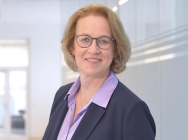November 17, 2010
Portable, capacitive-electrode-based EKG system wins 2010 Fresenius Inventors' Award
A jury of experts today presented the 2010 Fresenius Inventors' Award to a portable, capacitive-electrode-based electrocardiogram (EKG) system. Dr. Martin Oehler, an engineer from the Technische Universität of Braunschweig, Germany, won first place and €5,000 for his invention at the 11th Fresenius Inventors' Fair held in conjunction with the Medica international trade fair and congress in Dusseldorf, Germany. Second place and €3,000 were awarded to Jan-Marten Seitz, a mechanical engineer from the Institute of Materials Science at Gottfried Wilhelm Leibniz Universität in Hanover, Germany, who developed a process for the manufacture of bioresorbable magnesium stents (vessel wall supports). Physics Professor Werner Mäntele from the Institute for Biophysics at the Goethe University in Frankfurt am Main, Germany, was happy to receive the third prize and €2,000 for his device enabling the measurement of heparin concentration in blood by means of static diffusion of light.
The top prize-winning portable EKG system is equipped with over 29 capacitive sensors. These enable a high-resolution EKG measurement through clothing. The system can be applied directly over a patient's clothing and delivers an EKG signal within a few seconds. "Patients have to be disrobed in the case of conventional EKG measurements employing gel-based or dry electrodes, which causes delays. Furthermore, there is a risk of skin irritations as well as additional costs for consumable supplies in the use of adhesive electrodes," said award winner Oehler. "The capacitive EKG system we developed can save crucial time and is entirely reusable." An EKG records the electrical activity of coronary fibers. This information provides important parameters such as heart rate or cardiac rhythm, which render indications of heart conditions and coronary problems such as irregular heartbeat or a heart attack.
Seitz received the second prize for his process enabling the manufacture of bioresorbable magnesium stents. Stents are vessel wall supports which can be implanted in hollow organs in order to keep them fully open for example during paranasal sinus operations. Nonresorbable stents, for example made of silicon, are currently used for such applications. These either remain in the body, which can lead to complications for the patient, or subsequently must be removed, which can result in trauma and the formation of scar tissue. In contrast, the magnesium-alloy stents developed by Seitz are entirely bioresorbable, whereby their disintegration can be regulated by means of a special coating process.
The third-place device developed by Mäntele employs static diffusion of light to measure the concentration of heparin present in a patient's blood. Heparin is a medication to prevent the coagulation of blood. It is used, for example, during coronary surgery, in the course of hemodialysis treatments was well as in thrombosis prevention. Mäntele's apparatus measures the diffusion of light from nanoparticles formed within a blood plasma sample between heparin and the protamine peptide which counters the heparin's effectivity. Results are delivered within a matter of minutes and thus enable a precise control of blood coagulation both during and subsequent to an operation.
A total of 23 selected researchers and developers will be presenting their ideas until Nov. 19 during the Fresenius Inventors' Fair. A jury comprised of medical specialists and industry representatives chose the three prize winners from among the field of entries. The health care company sponsors the Fresenius Inventors' Fair to help researchers find professional business partners and industrial contacts as well as potential investors in order to further develop and market their ideas. Fresenius provides all the exhibiting entries display space and an exhibit booth at the fair free of charge, enabling them to present their developments to trade experts and media representatives from around the world. About 40 doctors, scientists, engineers, technicians and health care professionals were among the entrants this year. The Fresenius Inventors' Fair is held every two years during the Medica event. Last year, Medica had more than 138,000 visitors from Germany and abroad.
The Fresenius Inventors' Fair will be held Nov. 17-19 in Hall 8b during the Medica international trade fair and congress in Dusseldorf, Germany. Medica runs Nov. 17-20, 2010, from 10 a.m. to 6:30 p.m. (Saturday until 5 p.m.). Additional information on the Inventors' Fair is available at www.fresenius.com/inventorsfair; and about the Medica event at www.medica-tradefair.com.
Photographs of the award winners can be accessed online at http://tinyurl.com/erfinderpreis-2010.
Fresenius is a health care group with international operations, providing products and services for dialysis, hospital and outpatient medical care. In 2009, Group sales were approximately €14.2 billion. On Sept. 30, 2010, the Fresenius Group had 136,458 employees worldwide.
For more information, visit the company's website at www.fresenius.com.
This release contains forward-looking statements that are subject to various risks and uncertainties. Future results could differ materially from those described in these forward-looking statements due to certain factors, e.g., changes in business, economic and competitive conditions, regulatory reforms, results of clinical trials, foreign exchange rate fluctuations, uncertainties in litigation or investigative proceedings, and the availability of financing. Fresenius does not undertake any responsibility to update the forward-looking statements in this release.
Board of Management: Dr. Ulf M. Schneider (President and CEO), Rainer Baule, Dr. Francesco De Meo, Dr. Jürgen Götz, Dr. Ben Lipps, Stephan Sturm, Dr. Ernst Wastler
Supervisory Board: Dr. Gerd Krick (Chairman)
Coporate Head Office: Bad Homburg, Germany
Commercial Register: Bad Homburg, HRB 10660


